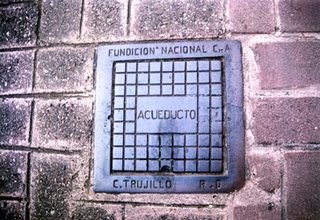Mario Vargas Llosa - 'The Feast of the Goat'
 There are certain things linking 'The Feast of the Goat' and 'The Blind Assassin'. Both use alternating narratives: one from a very specific strand of the past, the other in the present, reminiscing more generally, filling in the gaps and gradually revealing where the past has led. In both narratives there is an obvious crux: 'The Blind Assassin' opens with Laura Chase's suicide, as she drives dramatically off a bridge, and the rest of the novel is dedicated to explaining this event. Chapter two of 'The Feast of the Goat' introduces the four assassins of Rafael Leonidas Trujillo, dictator of the Dominican Republic from 1930 - 1961, waiting in a car for Trujillo's Chevrolet Bel Air to drive past, so they can pump it full of bullet holes. Roughly half of the novel is dedicated to explaining this event; the remainder deals with the fall-out.
There are certain things linking 'The Feast of the Goat' and 'The Blind Assassin'. Both use alternating narratives: one from a very specific strand of the past, the other in the present, reminiscing more generally, filling in the gaps and gradually revealing where the past has led. In both narratives there is an obvious crux: 'The Blind Assassin' opens with Laura Chase's suicide, as she drives dramatically off a bridge, and the rest of the novel is dedicated to explaining this event. Chapter two of 'The Feast of the Goat' introduces the four assassins of Rafael Leonidas Trujillo, dictator of the Dominican Republic from 1930 - 1961, waiting in a car for Trujillo's Chevrolet Bel Air to drive past, so they can pump it full of bullet holes. Roughly half of the novel is dedicated to explaining this event; the remainder deals with the fall-out.
Another point of comparison is the sexual preference of the dominant male presence in each book, for too-young women. In each case the girl concerned is pimped by her own father (in desperate straits) to a more powerful man for financial or political gain. Repression and machismo are constant themes, and the sad conclusion to draw from both is that, though order can be restored, brute force (or its financial equivalent) will often hold sway for so long that it is impossible to entirely recover from its effects. This is particularly true of 'The Feast of the Goat', in which the tyrant's domination affects not just a family, but a nation. The culture it describes is one of reasonable affluence (fast disappearing because of sanctions), but absolute repression. Political murders are common, the media is state-controlled. Trujillo has elevated himself to a God-like status: he owns 40% of the country's industry, and buys more for nominal sums people are too frightened to refuse; he sleeps with whoever he likes, including the wives and daughters of most of his ministers; his personal whorehouse is 'a kitsch monument' (p. 390), putting one in mind of Saddam's gold taps.
And yet, he is hard-working: the country doesn't run itself. This is not a mitigating circumstance, but it does explain a lot. The fear, the devotion. The rest of his family - his sons, brothers and wife - hang on his coat tails, without an ounce of his decisiveness or initiative. They just like being rich, and putting on generals' outfits. Trujillo's undoubted capacity for office is reflected twice through the actions of others: firstly, by contrast with the badly organised assassination (one of the assassins happens to know a trustworthy doctor, for instance, which he mentions after the event, when they are all riddled with cuts and a few bullet wounds - how can they not have thought of this in advance?), and most especially General Pupo's pathetic reaction to it, which shows the power of long habit; secondly President Balaguer's masterful improvisations, by which he manoeuvres himself from puppet president to the real thing. Far more of a politician than Trujillo, he proves adept at keeping enough people happy enough for the country to not break down in to civil war, or be invaded by America.
The most powerful section of 'The Feast of the Goat' comes after the assassination. This is where the structure differs from 'The Blind Assassin': now there is nowhere to go, the plot is no longer inevitable, and messy real life emerges from the clockwork. The remaining chapters each follow the fate of an involved party, truths emerging at their intersections. The quick deaths of Antonio de la Maza and Amandito are the least painful: they come out fighting, and face the inevitable. Amongst the pestilence of black Beetles which descends upon Ciudad Trujillo (Santo Domingo) after the assassination, each containing secret service agents and machine guns hungry for assassins and relatives of assassins. Horrible scenes of torture fill some of the later chapters, and Urania's rape by Trujillo (the novel's second crux) rounds things off, but surprisingly the ending does manage to be hopeful, though it can't be fulfilled. Things have changed. The Goat is dead. It's up to the people now.


No comments:
Post a Comment